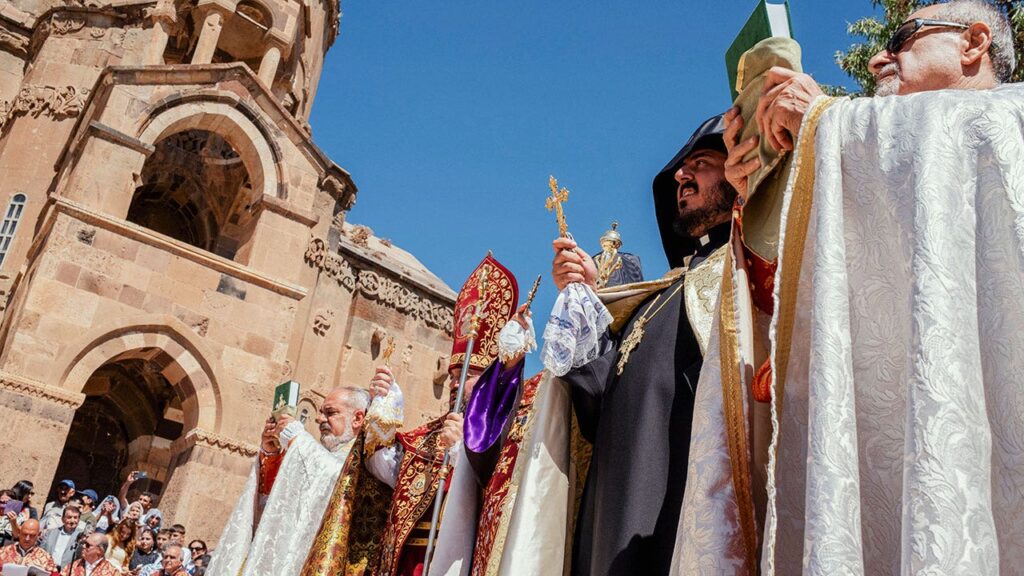Recent developments in Turkey have raised serious concerns about the treatment of Christians in the country, particularly regarding allegations of deportations framed under the guise of national security. Legal advocates from Alliance Defending Freedom (ADF) International highlighted these violations during a session at the Organization for Security and Co-operation in Europe (OSCE), calling the actions an “attack” on religious freedom. With over 350 foreign Christian workers expelled since 2020, these actions appear to mark a troubling trend of discrimination against religious minorities in Turkey.
| Article Subheadings |
|---|
| 1) Systematic Targeting of Christians |
| 2) Landmark Legal Cases |
| 3) Rising Discrimination and Official Denials |
| 4) Community Impact and International Reactions |
| 5) Future of Religious Freedom in Turkey |
Systematic Targeting of Christians
Legal experts have increasingly voiced concerns over Turkey’s practices concerning its Christian population. Reports indicate that Turkey has deported over 350 foreign Christian workers and their family members since 2020, including at least 35 individuals in a two-month span between December 2024 and January 2025. The Turkish government has assigned these individuals unique security codes, marking them as national security threats, effectively barring their future entry into the country.
During an address to the OSCE, legal expert Lidia Rieder criticized this systematic discrimination, pointing out the harsh implications of labeling peaceful worshippers as threats. “Turkey’s labeling of peaceful Christian residents as security threats is a clear misuse of law and an attack on freedom of religion,” she asserted, signaling the broader implications of such practices on global religious freedom standards.
Landmark Legal Cases
A notable aspect of this ongoing issue is the landmark case known as Wiest v. Turkey, currently pending before the European Court of Human Rights. This case has attracted significant attention as it may set a crucial legal precedent for protecting religious freedoms in Europe and beyond.
In this case, Kenneth Wiest, a U.S. citizen and Protestant, faced expulsion from Turkey after residing in the country legally for over 30 years. Upon returning from a trip in 2019, he was abruptly banned from re-entering Turkey without any evidence of wrongdoing. His case exemplifies the increasing presence of discriminatory policies aimed at religious minorities in Turkey since President Recep Tayyip Erdoğan took office more than a decade ago.
Rising Discrimination and Official Denials
Despite the troubling trends identified by various organizations and individuals, Turkey’s officials have dismissed the allegations as unfounded. The Turkish embassy in Washington, D.C., referred to statements released by Ankara’s communications center that deny any systematic discrimination against Christians. They argue that the measures taken are in line with standard administrative practices regarding foreign nationals.
The Turkish government emphasizes that its historical coexistence of Christians, Jews, and Muslims is a testament to its respect for religious diversity. However, the reported experiences of deportations and restrictions on religious practices tell a different story, one that raises questions about the government’s commitment to its stated principles of tolerance.
Community Impact and International Reactions
The implications of these practices extend beyond legal considerations. The Christian communities in Turkey face severe restrictions on their ability to worship and express their faith. Legal expert Rieder poignantly captures the reality for many Christians: “The reality on the ground remains deeply concerning for many individuals, families, and communities who continue to face restrictions on worship, deportations, and barriers to religious education.” The growing list of deported individuals represents not just numbers, but the disruption of lives and communities.
International reactions have varied. While organizations like the OSCE strive to address these human rights violations, their responses have often been met with skepticism from legal advocates who wish to see actionable outcomes. Rieder stressed the importance of translating Turkey’s proclaimed respect for fundamental freedoms into practical measures that protect its religious minorities.
Future of Religious Freedom in Turkey
Looking ahead, the future of religious freedom in Turkey remains uncertain. Advocates for human rights and religious freedom are urging international bodies to take decisive action against Turkey’s discriminatory policies. The OSCE is under pressure to ensure that its commitments to tolerance and non-discrimination remain more than just verbal affirmations but are acted upon effectively.
As cases like Wiest v. Turkey proceed, they potentially hold the key to influencing not only Turkey’s practices but also setting a precedent for religious freedom across Europe. Global attention to these issues may heighten, influencing diplomatic relations and international policies in ways that could usher in more favorable conditions for religious minorities.
| No. | Key Points |
|---|---|
| 1 | Turkey has deported over 350 foreign Christian workers since 2020. |
| 2 | Individuals are labeled as security threats, preventing their re-entry into the country. |
| 3 | The Wiest v. Turkey case is pivotal for religious freedom in Europe. |
| 4 | Turkey’s officials deny allegations of discrimination against Christians. |
| 5 | The international community is urged to take action against Turkey’s policies. |
Summary
The ongoing deportations and discrimination against Christians in Turkey underline a significant challenge for religious freedom in the country. With the international community closely watching, advocates stress the importance of translating rhetoric into meaningful protections. The developments surrounding cases like Wiest v. Turkey may well shape the future of religious liberties, not just in Turkey, but across the region.
Frequently Asked Questions
Question: What actions have been taken against Christians in Turkey?
Turkey has reportedly deported over 350 Christian workers since 2020, marking them as security threats and preventing their return.
Question: What is the significance of the case Wiest v. Turkey?
The case is pivotal as it may set a crucial legal precedent for religious freedom protections in Europe.
Question: How has the Turkish government responded to discrimination allegations?
The Turkish government has denied the allegations, asserting that administrative decisions are based on standard criteria unrelated to religious affiliation.
